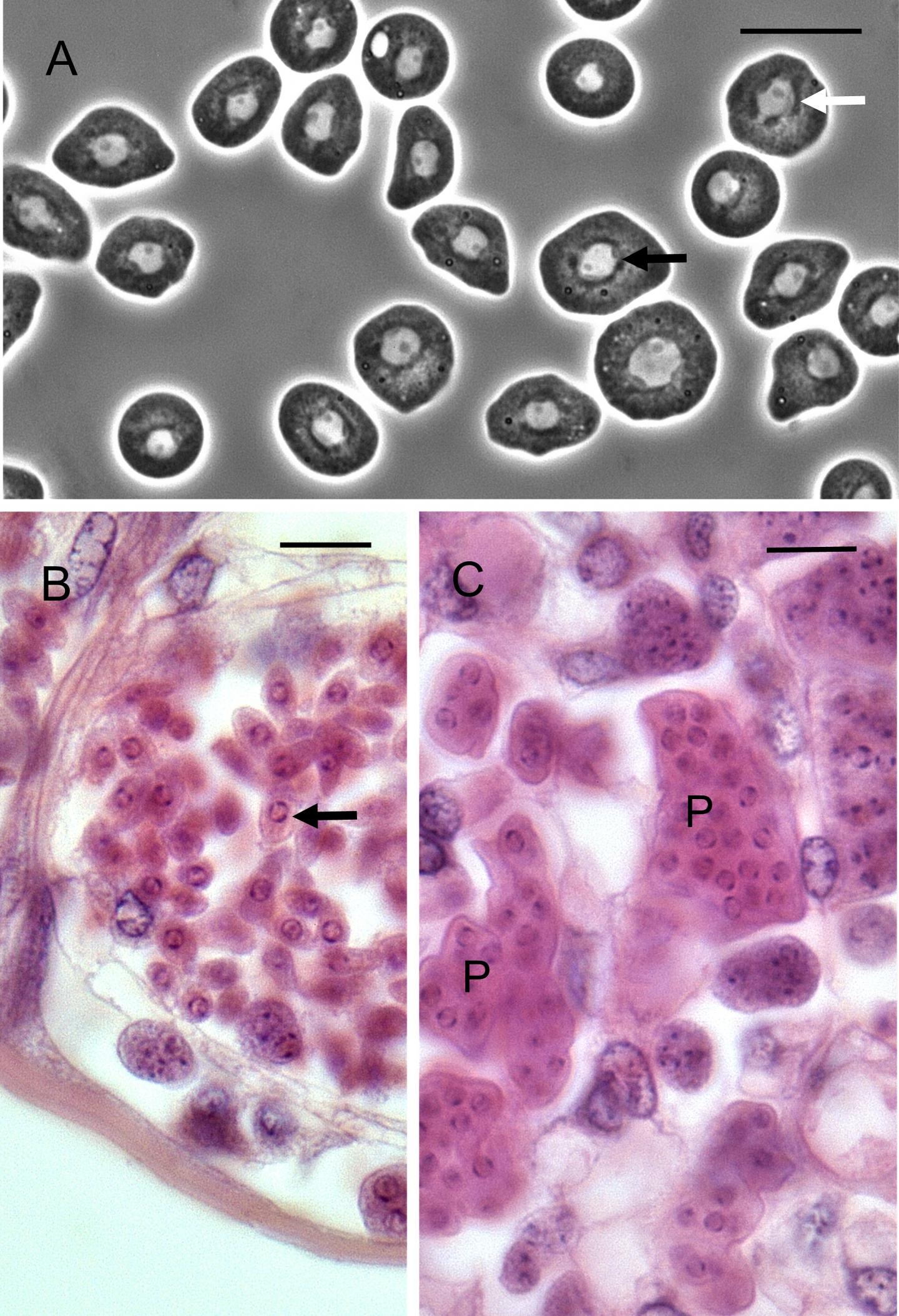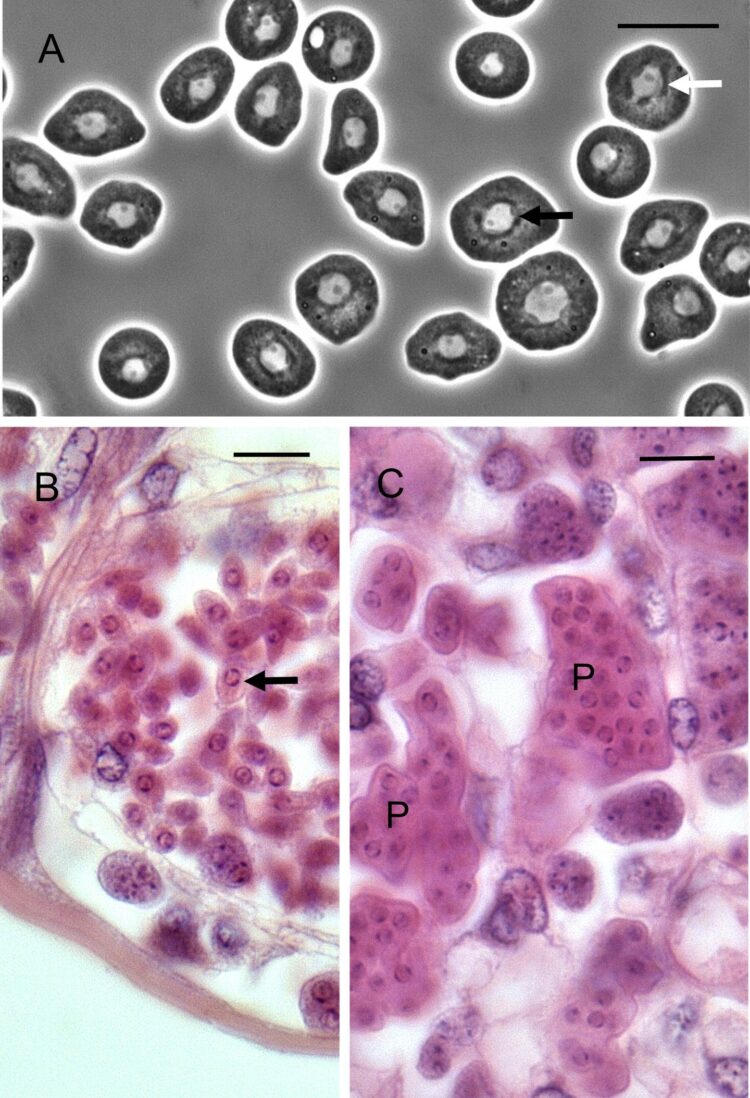
Credit: BlueFish Project/Swansea University
Swansea University researchers have discovered two new species of parasite, previously unknown to science, in crabs in Swansea Bay, during a study on disease in the Celtic and Irish Seas.
Both species are emerging pathogens, and were discovered infecting the common shore crab, so they could potentially have damaging effects on fisheries and other marine species. The researchers’ discovery will help inform measures to reduce this risk.
The common European shore crab is native to the UK, Ireland and the north east Atlantic. It shares this habitat with many commercially important species such as the edible crab and several lobster species.
The shore crab is also an invasive species in other countries as it can survive in a wide range of different environments, potentially carrying diseases with it.
The discovery was made by researchers from the BlueFish project in the University’s Biosciences department. They were carrying out a year-long, multi-disease monitoring survey over two locations in Swansea Bay: Mumbles Pier and Prince of Wales dock.
When they were examining the crabs, they noticed parasites in the blood which they had never seen before.
They used a range of methods, from analysing diseased tissue from the crabs, to examining the parasite DNA using a technique called Sanger sequencing. The sequences seemed to indicate a new species.
Collaborators at the Natural History Museum, London and CEFAS in Weymouth were able to generate a longer sequence of the parasite DNA, verifying the presence of two new parasite species.
The team have named the new species Haplosporidium carcini, after the host species, (Carcinus maenas) and Haplosporidium cranc, with ‘Cranc’ being Welsh for crab, a reference to both their Ireland-Wales funding, and the location of discovery, or ‘Welsh’ nature of the parasite.
The researchers also observed that:
- Infections were found in only one of the two locations – Mumbles Pier, Swansea Bay
- Infection levels were very low, around 1-2%
Dr Charlotte Eve Davies from Swansea University College of Science, Scientific Officer on the Bluefish project, said:
“It is so important to understand the role of the shore crab in hosting parasites and disease, and if they are passing these on to other commercially important crustaceans.
The systematic approach we used, employing different detection methods, is vital in getting the best possible picture of these new pathogens.
Our study and broader work also suggest that the overall habitat – physical surroundings and ecosystem -may be influencing the presence and prevalence of pathogens, depending on the location.
It’s been really exciting to be able to characterise two new species and a real team effort. Professor Andrew Rowley first noticed these new parasites and named them parasites x, y and z for months before we realised that we really did have a new species!”
The research was published in the journal Parasitology.
###
Notes to editors:
The research was published in the journal Parasitology.DOI: 10.1017/S0031182020000980
The BlueFish Project has been funded by the European Regional Development Fund through the Ireland-Wales Co-operation Programme 2014-2020, a cross-border programme investing in the overall economic, environmental and social well-being of Ireland and Wales.
Swansea University is a world-class, research-led, dual campus university offering a first-class student experience and has one of the best employability rates of graduates in the UK. The University has the highest possible rating for teaching – the Gold rating in the Teaching Excellence Framework (TEF) in 2018 and was commended for its high proportions of students achieving consistently outstanding outcomes.
Swansea climbed 14 places to 31st in the Guardian University Guide 2019, making us Wales’ top ranked university, with one of the best success rates of graduates gaining employment in the UK and the same overall satisfaction level as the Number 1 ranked university.
The 2014 Research Excellence Framework (REF) 2014 results saw Swansea make the ‘biggest leap among research-intensive institutions’ in the UK (Times Higher Education, December 2014) and achieved its ambition to be a top 30 research University, soaring up the league table to 26th in the UK.
The University is in the top 300 best universities in the world, ranked in the 251-300 group in The Times Higher Education World University rankings 2018. Swansea University now has 23 main partners, awarding joint degrees and post-graduate qualifications.
The University was established in 1920 and was the first campus university in the UK. It currently offers around 350 undergraduate courses and 350 postgraduate courses to circa 20,000 undergraduate and postgraduate students. The University has ambitious expansion plans as it moves towards its centenary in 2020 and aims to continue to extend its global reach and realise its domestic and international potential.
Swansea University is a registered charity. No.1138342. Visit http://www.
For more information:
Kevin Sullivan, Swansea University Public Relations Office [email protected]
Follow us on Twitter: http://www.
Find us on Facebook: http://www.
Media Contact
Kevin Sullivan
[email protected]
Related Journal Article
http://dx.





